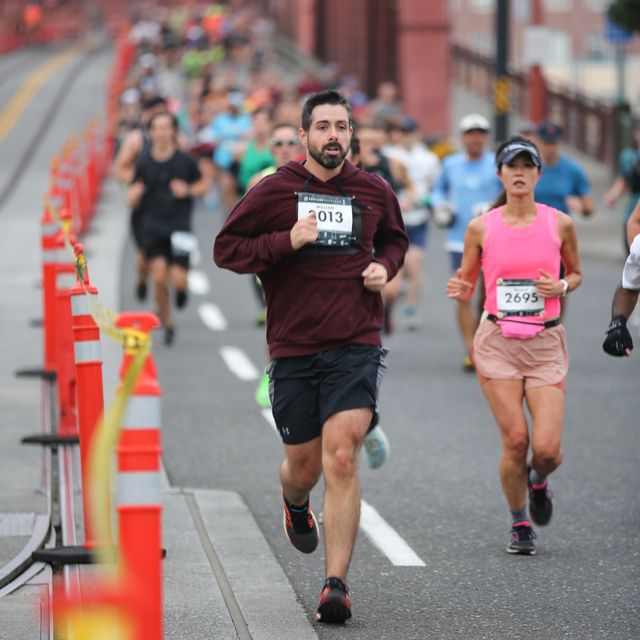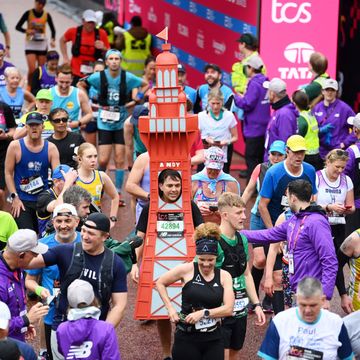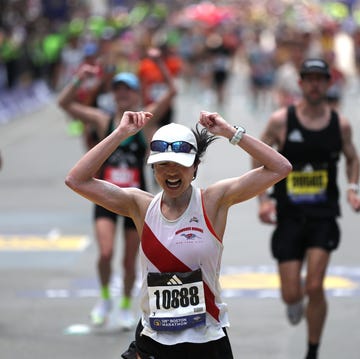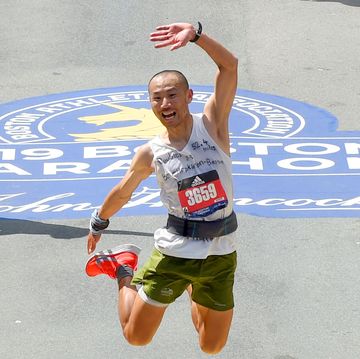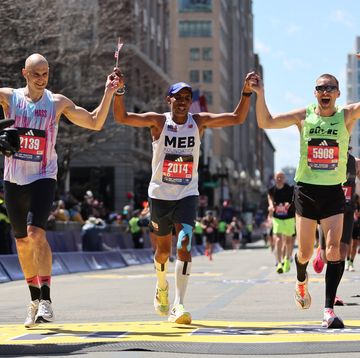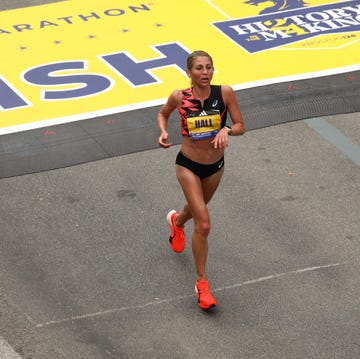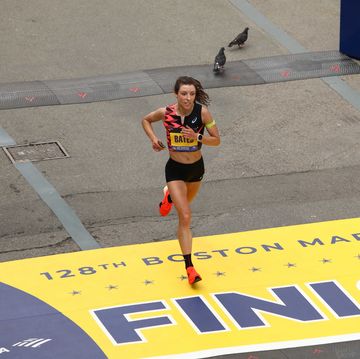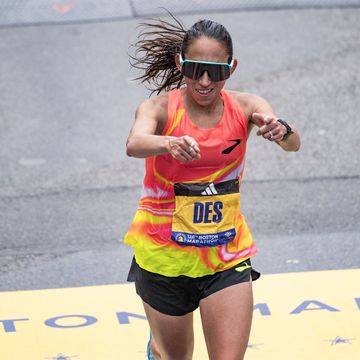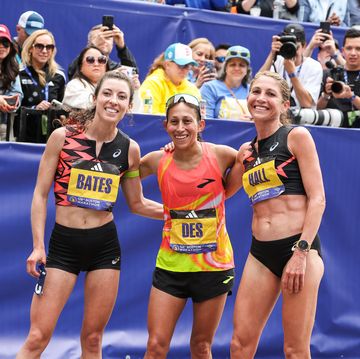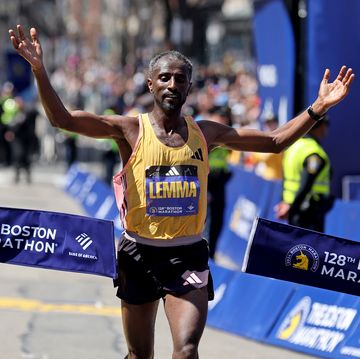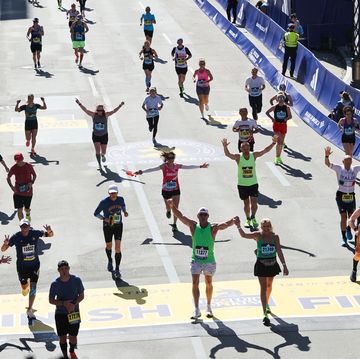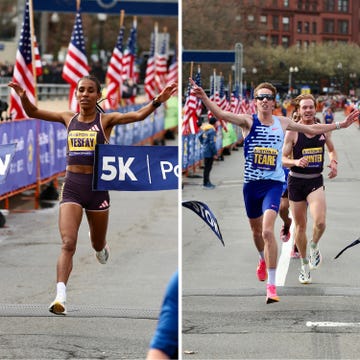After years of snafus and miscues, a revamped Portland Marathon and its concurrent half marathon—under new management and with a new route through downtown—went off on Sunday and garnered largely positive reviews.
But for about 15 to 20 of the race’s fastest runners—organizers don’t yet have an exact number who were affected—this edition of the 48-year-old race was another exercise in frustration.
By mile 9, the eventual race winner, Kallin Khan, had already opened up a sizable lead. With a motorcycle guiding him, he was out of sight of the trailing pack.
Runners were supposed to bear right from the Naito Parkway onto Ross Island Way. But the turn lacked clear signs. Instead, several runners following Khan and the lead woman continued on Naito Parkway. Some went almost a mile too far, which involved a significant climb, before realizing they had gone the wrong way. (The cars whizzing by them at 50 miles per hour were also a sign that something was amiss.)
Dan McDowell, 37, of Portland was one of those runners. “Probably the first inklings that something was off was about a half mile off the course,” McDowell said. After a mile, he and others running near him were sure they had gone the wrong way.
He had been hoping for a sub-2:45 time. He has already run 29 road marathons, and eight of those he has finished right around 2:46.
McDowell said he had a “little bit of a meltdown” and then decided to start running to where he knew his wife would be waiting for him. He dropped out to save his legs for another day.
Race director Jared Rohatinsky said all runners affected by the missed turn would have their entry fees refunded and be offered free entry into future events.
“I am not downplaying the significance of what happened,” he said. “If I had been training for a marathon, and this happened, absolutely I would be frustrated. My heart is aching for them.”
Within minutes, he said, when organizers received word of runners going on the wrong route, they had a course marshal at the confusing spot to direct runners and set up a line of cones to keep other runners from going off course.
Overall, Rohatinsky said, runners were raving about the event. “This was a very successful rebirth of the Portland Marathon,” he said. “This is what Portland has been waiting for.” Nearly 5,000 finishers are listed on the race’s website between the marathon and the half.
The Portland Marathon, founded in 1972, was for decades a treasured race in the Pacific Northwest. But in 2015, problems began. Organizers didn’t have the finish line tape ready for the winner and instead gave the first-place trophy to the man who finished third.
In 2016, several hundred runners went off course early in the race, adding at least a half mile to their distance and slowing several would-be Boston qualifiers.
By 2017, then-race organizers Les Smith and Mamie Wheeler were locked in a dispute with city agencies about the course’s medical plan and paying for police overtime. The city delayed issuing a permit for the event and demanded a revised course. At that time, the state attorney general began investigating the nonprofit for improper management and determined that Smith and Wheeler owed the race $865,000.
Paula Harkin, who operates several races in the Portland area, took over the marathon on short notice in 2018. For one year only, she rebranded it the Portlandathon. Despite her efforts to coordinate with railroad company Union Pacific, a freight train rumbled through the course and delayed many of the faster runners by about 15 minutes.
Brooksee, an events management company based in Utah that operates nine races across the western U.S. and Canada, took control of the Portland Marathon for the 2019 race. Rohatinsky is the CEO.
Brooksee unveiled an ambitious new course that was to stay downtown instead of looping through the city’s industrial areas. And the organizers developed an innovative system for rerouting runners to accommodate three crossings of the MAX, Portland’s light rail. (Scroll down to the “trains” section of course information for an explanation of how it worked.)
All of that went smoothly. On a “Run Portland” Facebook page, moderated by the event, runners complimented the course, the crowd support, and the amenities.
[From training tips, to fueling strategies, to improving the mind-body connection, the Runner's World 2020 Calendar will help you run your best all year long.]
But the tight-knit community of sub-elite runners in Portland could be forgiven for thinking their hometown event is cursed, because this year’s glitch seemed reminiscent of many in the past. Khan’s margin of victory was nearly 21 minutes because of the struggles of the runners behind him.
Dan Lenski, who finished third in the men’s race after going only about three minutes off course, said he was third, “with a big asterisk.” He knew others who were faster likely went farther out of the way.
He also pointed out that at two points in the course, faster marathon runners merged with slower half marathoners, and the marathoners had to work their way through crowds of people walking on a narrow path. Rohatinsky said that his team is considering starting the half marathon earlier next year to avoid the overlap.
But compared to the race’s reputation under previous organizers, Lenski said, it was an improvement.
“They did a really good job of solving the trains problem,” he said. “I do think the hearts of the new organizers are in the right place.”

Sarah Lorge Butler is a writer and editor living in Eugene, Oregon, and her stories about the sport, its trends, and fascinating individuals have appeared in Runner’s World since 2005. She is the author of two popular fitness books, Run Your Butt Off! and Walk Your Butt Off!
